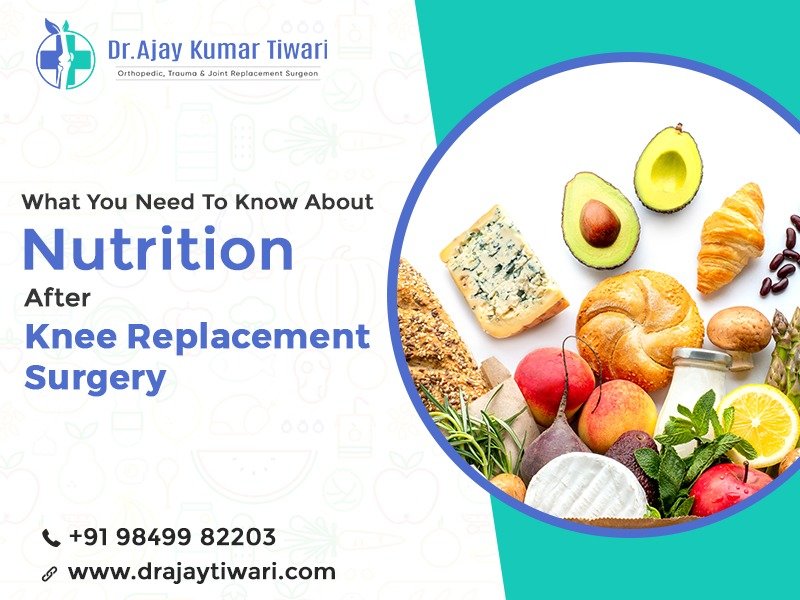
What you need to know about nutrition after Knee Replacement Surgery ?
In order to ensure a healthy recovery following orthopaedic surgery, such as knee replacement or fracture treatment, along with getting plenty of rest and taking proper care of the wounds, you should also consider good nutrition. Orthopaedic surgical procedures can put your body under extreme stress since your body’s metabolism speeds up during the healing process. A well-balanced, nutritious diet is very important for healthy tissue growth, healing, and quick recovery.
Following are the nutrients that serve as building blocks following knee replacement surgery and ensure a rapid and healthy recovery. Most of the required nutrients can be obtained naturally from the regular food we consume daily. Let’s explore some bone-healing foods that promote your recovery process.
Protein
Approximately 55% of our bones are composed of protein, making it a key ingredient in the bone-healing diet. Following knee replacement surgery, including this nutrient in your diet can reduce bone loss, minimise the likelihood of post-surgical infections, and increase bone density. Protein deficiency, on the other hand, inhibits bone-building hormones, leading to a slower recovery process.
Vegetarian Sources of Protein
The following food items should be included in the vegetarian diet to provide them with the essential amino acids present in protein:
- Soya beans and soy products
- Quinoa
- Chia seeds
- Spinach
- Beans & Peas
- Artichokes
- Lentils
Meat, fish, poultry, seafood, eggs etc., are the important non-vegetarian sources of protein. It is recommended to consume 1 to 1.2 grams of protein/kg of your body weight in order to promote healing.
Calcium
After surgery, calcium is an essential mineral for bone growth that works in harmony with protein. In addition to our bones, our heart, muscles, and nerves also require calcium to ensure proper functioning. The best calcium sources are dairy products like milk with less-fat or no-fat, yoghurt and cheese. Fortified foods like seeds, legumes, tofu or rice milk. Dark leafy vegetables such as broccoli, spinach, and kale, are also excellent sources of calcium.
According to some studies, 600-1,000 milligrams of calcium per day is recommended for bone health.
Vitamin D
Calcium and vitamin D work together to improve bone health since vitamin D helps the body absorb calcium and use it. Our best source to obtain Vitamin D is from the sun. The vitamin D level in our bodies can vary depending on the season, time and place we live. Vitamin D can also be found in foods like fatty fish, tuna, eggs, cheese and fortified milk.
Vitamin C
Vitamin C enhances antioxidant properties, which play a crucial role in maintaining our bodies’ immunity and its functions, particularly in wound healing. In addition, vitamin C is capable of neutralising the effects of free radicals that make the condition more severe. Vitamin C aids in the production of collagen, a protein that is present in tendons, ligaments that connect the bones to muscles. By increasing intake of this nutrient, patients are likely to heal more quickly following surgery.
Citrus fruits such as oranges, grapes, kiwi, lemon etc., and vegetables like broccoli, cauliflower, capsicum, Brussels sprouts etc., are rich in Vitamin C. After surgery, the body requires more Vitamin C than usual for better healing, so 500 mg of Vitamin C a day is recommended.
Zinc
Zinc, along with the combination of vitamin C, and protein, assist in accelerating the recovery process after orthopaedic surgeries like knee replacement. Bone health is compromised when the same is deficient.
Some studies have shown that zinc helps heal wounds, repairs fractured bones and reduces the risk of osteoporosis due to its role in collagen synthesis. You can find zinc mostly in animal products. Oysters, meat, dark poultry etc., are some of the best sources of protein from non-veg and, at the same time, cereals, dairy products, beans, nuts etc., contain moderate amounts of zinc.
Anti-inflammatory Diet
Omega 3 fatty acids are well known for their anti-inflammatory properties and their role in the formation of bones.
Swelling and bruising are inevitable following surgery. Any method used to reduce or prevent inflammation is worthwhile. Foods rich in antioxidants (often red colour) like pomegranates, red cherries, and beetroot can reduce inflammation and speed up recovery. A standard “Mediterranean diet” (which consists of fish, fruits, vegetables, nuts & seeds, beans etc.) is a potent anti-inflammatory diet beneficial for recovery. It is best to limit foods high in processed sugar as sugar makes the body more inflammatory.
Fibre
Medication prescribed after surgery might cause constipation (digestive problem). So adding fibre-rich foods to your diet and drinking more water can help with constipation. The most effective remedy for constipation is juices and fruits.
By including these foods with the bone-healthy nutrients in your diet, you will be able to recover from surgery a lot faster. However, it is essential to consult your physician regarding the appropriate nutrient ratio in your diet.
To know more details about diet after knee replacement surgery, book an appointment with Dr. Ajay Tiwari, one of the leading orthopaedic knee replacement surgeons in Hyderabad.





